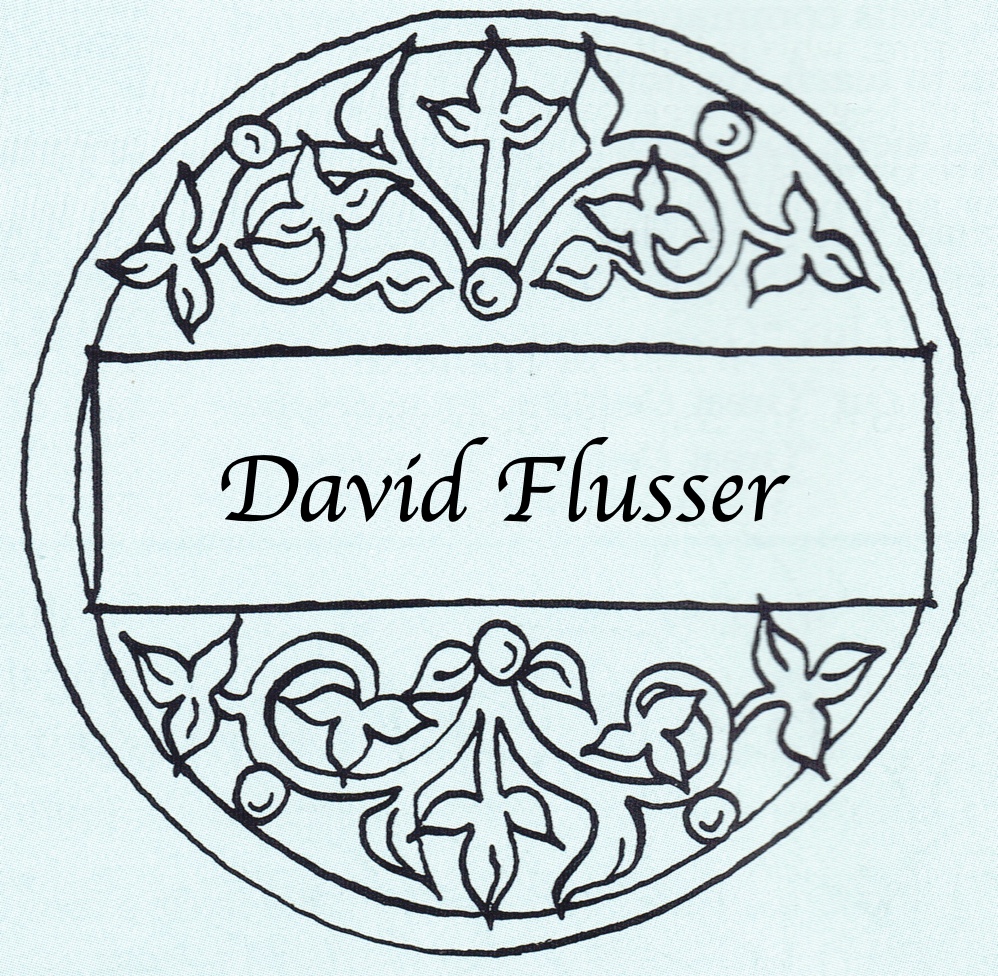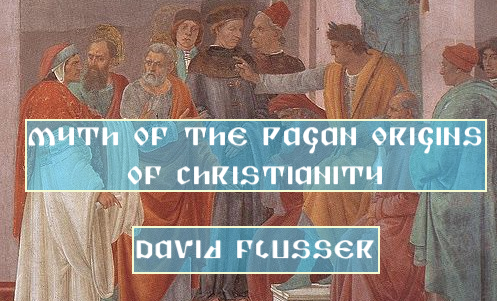How to cite this article: David Flusser, “Myth of the Pagan Origins of Christianity” Jerusalem Perspective (2014) [https://www.jerusalemperspective.com/11771/].

That Christianity developed from Jewish roots is a well-known fact. Early Christian literature cannot be viewed as a phenomenon parallel to and separate from Judaism, or as derived from Greek thought. Recent scholarship generally confirms the strong bond between early Christianity and Second Temple Judaism, and this is especially the case in the field of research dedicated to the study of the Dead Sea Scrolls. Thus the artificial constructions of scholars who once sought to build a bridge directly from Hellenism to Christianity are being dismantled, both because of greater knowledge of the Greek world and due to more intensive study of ancient Jewish and Christian thought. In addition to the importance of the scrolls for explaining the formative stages of the second stratum of Christianity, that is, of Paul and of the author of John’s Gospel, the Dead Sea Scrolls have shown that many religious concepts that had been considered Greek are actually of Jewish origin. This fact greatly surprised scholars, even though prior to the publication of the scrolls no exact Greek parallels had been found. In this study I do not intend to treat the problem of Greek influence on Judaism and, via the latter, on Christianity. My goal will be to achieve a more modest objective: to present a general survey of the forces that prevailed during the formative generations of Christianity.
Premium Members and Friends of JP must be signed in to view this content.
If you are not a Premium Member or Friend, please consider registering. Prices start at $5/month if paid annually, with other options for monthly and quarterly and more: Sign Up For Premium
Conclusion
Modern scholarly attempts to find strong Greek influence on early Christianity led to the creation of hypothetical constructions based on the later Greek world whose many literary works are well known. However, most of the phenomena of early Christianity can be fully explained on the basis of extant Jewish sources. The cultural ferment in Second Temple Judaism with its pneumatic phenomena and its way of thinking about the supernatural gave birth to Christianity. If Christianity contains phenomena that did not originate in Second Temple Judaism, they were likely generated by Christianity itself, for Christianity constituted a special third force alongside Judaism and paganism.
- [1] See Louis Ginzberg, "Aquila," in Jewish Encyclopedia (ed. Isidore Singer; New York: Ktav, 1912), 2:34-38. ↩
- [2] See Frederick Field, Origenis Hexaplorum quae Supersunt (Oxford: Clarendon, 1875), 1:xix. ↩
- [3] To find support for their opposition to Judaism, certain Protestant theologians claim that Marcion was not influenced by Gnosticism. ↩
- [4] Cf. Justin Martyr, First Apology 26:5: "Marcion, a man of Pontus,...is even at this day alive, and teaching his disciples to believe in some other god greater than the Creator," and also chap. 58. ↩
- [5] Gilles Quispel, Ptolémée: Lettre a Flora (Paris: Éd. du Cerf, 1949), 12-14. ↩
- [6] This school is called the religionsgeschichtliche Schule. A description of its methods and an evaluation are found in A. Schweitzer, Geschichte der paulinischen Forschung (Tübingen: Mohr [Siebeck], 1911), 141-189. (I have not actually seen the book, but learned of it indirectly.) An English translation by W. Montgomery is available: A. Schweitzer, Paul and his Interpreters—A Critical History (London: A. & C. Black, 1912). ↩
- [7] It is worthwhile tracing the various anti-Jewish tendencies present in modern Christian interpretations. See Jules Isaac, Jésus et Israel (Paris: Fasquelle, 1959). ↩
- [8] See my discussion in "Jesus' Place in First-century Judaism and His Influence on Christian Doctrine" under the subheading "Jesus and the Pharisees." ↩
- [9] As this is the only occurrence of actual Sabbath desecration in the Synoptic Gospels, it seems that the story is not entirely faithful in all its details. ↩
- [10] R. Simon b. Menasiah, on Exodus 31:14: "You shall keep the Sabbath, because it is holy to you," in Mechilta de Rabbi Ishmael 1:27-28, Tractate Shabbata, (ed. Jacob Z. Lauterbach; Philadelphia: Jewish Publication Society, 1935), 3:198. ↩
- [11] For a recent treatment of Jesus' stance on divorce as compared to Pharisaic halachah, see Peter J. Tomson, "Divorce Halakhah in Paul and the Jesus Tradition," in The New Testament and Rabbinic Literature (eds. Reimund Bieringer, Florentino García Martínez, Didier Pollefeyt, and Peter J. Tomson; Leiden: Brill, 2010), 289-332. ↩
- [12] Quispel, Ptolémée: Lettre a Flora, 4, 4-10. ↩
- [13] See David Flusser, "The Dead Sea Sect and Pre-Pauline Christianity," in Judaism and the Origins of Christianity (Jerusalem: Magnes, 1988), 23-74. ↩
- [14] See Rudolf Bultmann, Theologie des Neuen Testaments (Tübingen: Mohr [Siebeck], 1958), 48-50. ↩
- [15] See Flusser, "The Dead Sea Sect and Pre-Pauline Christianity," 25-30. ↩
- [16] See David Flusser, "From the Essenes to Romans 9:24-33," in Judaism and the Origins of Christianity, 75-87. ↩
- [17] See Flusser, "The Dead Sea Sect and Pre-Pauline Christianity," 30-35. ↩
- [18] See Flusser, "The Dead Sea Sect and Pre-Pauline Christianity," 60-71. ↩
- [19] See Flusser, "The Dead Sea Sect and Pre-Pauline Christianity," 54-60. ↩
- [20] See Flusser, "The Dead Sea Sect and Pre-Pauline Christianity," 44-50. ↩
- [21] See Flusser, "The Dead Sea Sect and Pre-Pauline Christianity," 35-44. ↩
- [22] See Flusser, "The Dead Sea Sect and Pre-Pauline Christianity," 50-54. ↩
- [23] See David Flusser, "Paganism in Palestine," in The Jewish People in the First Century (eds. Shmuel Safrai and Menahem Stern; CRINT I.2; Philadelphia: Fortress, 1976), 1097-1098. ↩
- [24] Cf. Epistle of Barnabas, chap. 2; Justin Martyr, Dialogue with Trypho, chap. 22. ↩
- [25] E.g., Justin Martyr, First Apology, chap. 5-6, 25, 54. ↩
- [26] Cf. David Flusser, "Paganism in Palestine," 1098. ↩
- [27] It is well known that the fact that Christianity was a recent innovation bothered the early Christians. This was because in Greco-Roman society a cultural phenomenon was considered significant only if it were very ancient. In their efforts to prove their antiquity, Christians emphasized their connection to Judaism, an ancient religion, and in order to further antedate the history of Christianity, they made use of the Jewish claim that the great Jewish leaders of biblical times were the teachers of the ancient Greek thinkers (cf., e.g., Justin Martyr, First Apology, chap. 59; idem, Hortatory Address to the Greeks, chap. 22ff.). ↩
- [28] See David Flusser, "Paganism in Palestine," 1065-1100. ↩
- [29] On the monotheistic trend in Hellenistic religion, see David Flusser, "The Great Goddess of Samaria," Israel Exploration Journal 25 (1975): 13-20, and David Flusser, "Paganism in Palestine," 1098. ↩
- [30] On baptism and the Holy Spirit, see David Flusser, "Yohanan ha-Matbil ve-Kat Midbar Yehudah [John the Baptist and the Dead Sea Sect]," in Jewish Sources in Early Christianity: Studies and Essays (Tel Aviv: Sifriat HaPoalim, 1979), 81-112 [in Hebrew]. ↩
- [31] See David Flusser, "Martyrology in the Second Temple Period and Early Christianity," in Judaism of the Second Temple Period: Volume 2, The Jewish Sages and Their Literature (trans. Azzan Yadin; Grand Rapids, MI and Jerusalem, Israel: Eerdmans, Jerusalem Perspective and Magnes Press, 2009), 248-257. ↩
- [32] See my discussion in "Jesus' Place in First-century Judaism and His Influence on Christian Doctrine" under the subheading "The Third Day He Rose Again." ↩
- [33] By the "myth of Jesus," Flusser does not mean belief in the resurrection, but belief in a cosmic divine figure whose story and significance have been divorced from the history and faith of the Jewish people.—JP ↩
- [34] Julius Firmicus Maternus, De Errore profanarum religionum (ed. K. Ziegler; Munich: Max Hueber, 1953), 24.2. ↩
- [35] See my discussion in "Jesus' Place in First-century Judaism and His Influence on Christian Doctrine" under the subheading "And Sits at the Right Hand of God." ↩
- [36] Cf. Ign. Eph. 7:2, 18:2; Ign. Rom. 3:3; Ign. Smyrn. 1:1; Ign. Pol. 8:3. ↩
- [37] E.g., Pol. Phil. 12:2. ↩
- [38] Until recently our knowledge of Gnosticism came, for the most part, from patristic polemics against Gnosticism. Presently, the gnostic library, discovered at Nag Hammadi in Egypt, is becoming available for scholars. See Jean Doresse, Les Livres secrets des Gnostiques d'Egypte (Paris: Plon, 1958), 115-121. ↩
- [39] For further discussion of Simon Magus, see David Flusser, "Great Goddess of Samaria," 18-20. ↩
- [40] Docetism is a trend that considers the humanity of the suffering Christ on earth as apparent rather than actual. ↩
- [41] It is also possible that in Judaism the idea of a parallelism between the spiritual and material worlds derives from Persian influences of the Zoroastrian religion, the only religion whose impact on Judaism is significant. According to Zoroastrianism, the spiritual world was created before the material world, and there are parallels to the concepts of the Holy Spirit and archangels and correspondence with Jewish motifs of eschatology and the belief in a final resurrection. Perhaps many of the "mystical" ideas Christianity inherited from Judaism are of Persian origin. ↩


![David Flusser [1917-2000]](https://www.jerusalemperspective.com/wp-content/uploads/userphoto/21.jpg)
